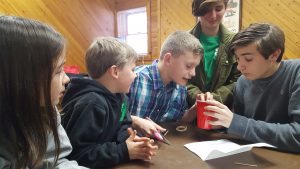Main Content
 Games can be a fun way for 4-H members to learn new things and practicing what they have learned in their 4-H club. The following methods have proven successful in both entertaining the children as well as reinforcing things they’ve learned.
Games can be a fun way for 4-H members to learn new things and practicing what they have learned in their 4-H club. The following methods have proven successful in both entertaining the children as well as reinforcing things they’ve learned.
Quiz bowl – We have invested in a game buzzer system like the one used in Avian Bowl. The team structure and rules are generally the same as that used in Avian Bowl, but the approach is less formal. I prepared over 100 questions related to poultry and small animals (health, care, feeding, housing, breeds, diet, etc.) that are used. The children are very receptive and have a lot of fun with it. The teams are sometimes broken up by age group so that questions can be chosen according to level of difficulty and sometimes teams are a mix of age groups, which also allows the younger children to contribute answers. Each way of distributing children into teams has advantages and disadvantages but both work.
Charades/Pictionary – I prepare cards which have terms related to poultry and small animals (health, care, feeding, housing, breeds, diet, body parts, etc.). BEFORE the child looks at the card they have chosen, they must decide if they want to act it out or draw it. If their team guesses the answer in the allotted time they get 1 point, otherwise, the answer is revealed and the team gets 0 points. The teams rotate turns and also rotate which players are drawing/acting. The children love this game and have a lot of fun with it.
Easter Egg Hunt – I fill plastic eggs with questions related to poultry and small animals (health, care, feeding, housing, breeds, diet, body parts, etc.) and hide them. The children are divided into teams and are directed to find all the eggs of the color assigned to them. They must correctly answer the question before they are allowed to keep the egg and put it in their basket. When they have collected all six eggs they are given a clue to where their prizes are hidden. Needless to say, the children love this game.
“What If” – Sometimes we will gather the children in a circle and just talk about how they would design their dream coop to take care of a sick bird. As an example, I told them I would come to each of their houses and build them a coop for their birds, but I pretended to know nothing about what was needed and asked them what was wrong with my idea and to tell me the correct way. The children are less enthusiastic about this method because there is only discussion and no hands-on activity. An alternative to this activity, could be to give the children various craft and art supplies (paper, clothes pins, toothpicks, pipe cleaners, popsicle sticks, foil, cardboard, felt, etc.) and ask them to design a chicken coop.
By Sheryl Brown, Fur ’n Feathers 4-H Club Leader, Hunterdon County